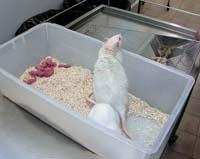Rats trained with stem cells

For the first time in the world, paralyzed rats have undergone a nerve cell transplant that has significantly improved their motor capacity.
In the experiment, embryonic stem cells grow to obtain neuronal precursors. Once neurons have been generated, 60,000 of them have been injected into 8 groups of rats of 15 animals. Each of these groups has been included with a chemical cocktail of one type or another to analyze their influence on cell development. With the help of these compounds, 20% of the 60,000 neurons have managed to convert the neuron into motor. Of these, 1% have penetrated the spine of rats, and only a few hundred have managed to create new relationships between nerve cells. Compounds that contribute to this process have been identified, among others, cyclic AMP dibutril, rolipram and growth factor called GDNF.
According to the researchers, the experiment reveals that embryonic stem cells are the pathway for the creation of motor neurons, which have also been shown in favor of their use in humans.





